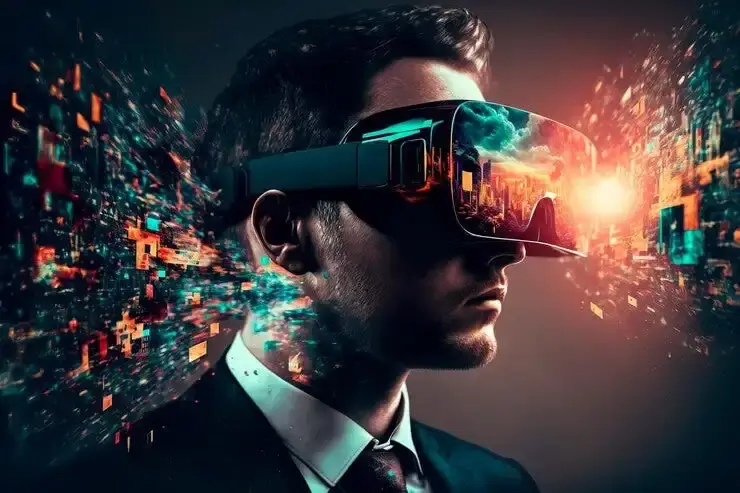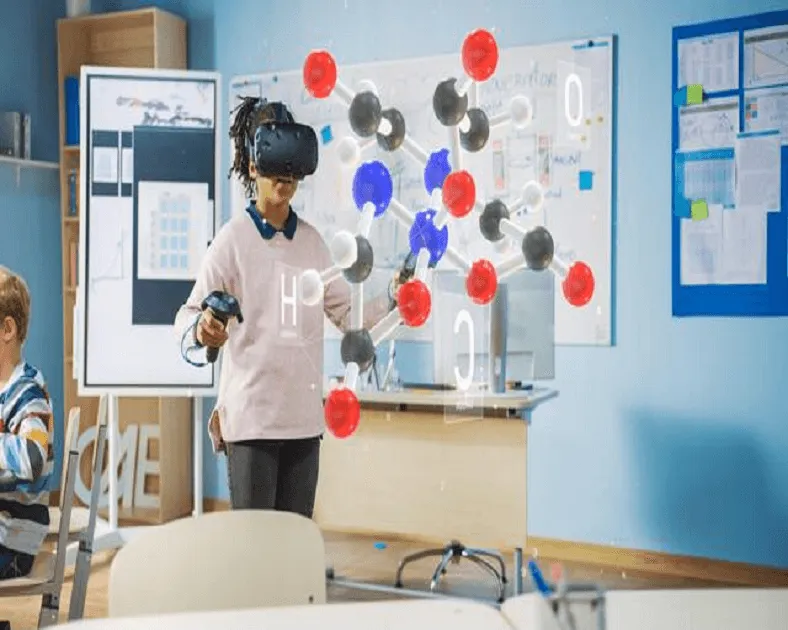VR
Asfan Company's Pioneering Role in VR Content Creation
In the realm of technology, Virtual Reality (VR) stands as a revolutionary
force, reshaping the way we
perceive and interact with the digital world. As the boundaries between the physical and virtual
realms
blur, VR has emerged as a transformative tool with applications ranging from entertainment
and education to
healthcare and beyond. At the forefront of this digital revolution stands
Asfan Company, a trailblazer in VR
content creation, whose innovative approach and commitment to excellence have propelled the medium to new
heights.
VR
technology transports users into immersive digital environments, where they can explore, interact, and
experience scenarios that were once confined to the realms of imagination. Whether
it's diving into the
depths of the ocean, traversing distant galaxies, or reliving historical events, VR has
the power to
transport users to places they could only dream of. This ability to create alternate realities has profound
implications across various industries, from gaming and entertainment to education and training.
Asfan Company recognized the immense potential of VR early on and set out to harness its power to
create
unparalleled immersive experiences. Through a combination of cutting-edge
technology, creative talent, and a
passion for pushing boundaries, Asfan has established itself as a leader in the field of VR
content
creation.
One of the key strengths of
Asfan Company lies in its multidisciplinary team of experts, including
developers, designers, artists, and storytellers. This diverse talent pool allows Asfan to approach VR
content creation from multiple angles, blending technical expertise with creative vision to deliver truly
immersive experiences. Whether it's developing realistic virtual environments, designing
intuitive user
interfaces, or crafting compelling narratives, Asfan's team collaborates seamlessly to bring ideas to life
in the virtual world.
Moreover,
Asfan Company is committed to staying at the forefront of technological innovation, constantly
exploring new tools and techniques to enhance the VR experience. From advanced graphics rendering and
spatial audio technologies to breakthroughs in haptic feedback and motion tracking, Asfan leverages the
latest advancements to create immersive worlds that captivate the senses and push the boundaries of what's
possible in VR.
But perhaps what sets
Asfan Company apart is its unwavering commitment to quality and excellence. Every
project undertaken by Asfan undergoes rigorous testing and refinement to ensure that the final product meets
the highest standards of performance and user experience. From the smallest details of texture and lighting
to the overall flow of gameplay or narrative, no aspect is overlooked in the pursuit of perfection.
Asfan's dedication to excellence has not gone unnoticed, earning the company accolades and recognition
within the industry and beyond. From award-winning VR experiences to partnerships with leading
technology
companies and content creators,
Asfan's work continues to push the boundaries of what's possible in VR
content creation.
Looking ahead, the future of VR holds limitless possibilities, and
Asfan Company
is poised to lead the way.
Whether it's exploring new genres and storytelling techniques, expanding into emerging markets, or pushing
the technical limits of VR hardware,
Asfan remains committed to driving innovation and shaping the future of
immersive entertainment.
In conclusion, VR stands as a transformative force in the world of technology, offering unparalleled
opportunities for exploration, creativity, and connection.
Asfan Company's pioneering role in VR
content
creation has helped to unlock the full potential of this groundbreaking medium, creating immersive
experiences that captivate and inspire audiences around the globe. With its unwavering
commitment to
excellence and innovation,
Asfan continues to push the boundaries of what's possible in VR,
shaping the
future of entertainment one virtual world at a time.
What is a VR used for?

Virtual Reality (VR) serves various purposes across different industries and fields. Here are some common uses:
-
Gaming: VR gaming allows players to immerse themselves in virtual worlds, interacting with environments and characters in a more immersive way than traditional gaming.
-
Training and Simulation: VR is used extensively for training purposes in industries such as aviation, military, healthcare, and manufacturing. It provides a safe and controlled environment for trainees to practice skills and procedures.
-
Education: VR can enhance learning experiences by providing immersive simulations and virtual field trips. Students can explore historical sites, dive into the human body, or experience scientific phenomena in a way that traditional methods cannot replicate.
-
Healthcare: VR is used for pain management, therapy, and rehabilitation. It can also assist in medical training and surgery simulations.
-
Architecture and Design: Architects and designers use VR to create immersive experiences for clients, allowing them to visualize buildings and spaces before construction begins.
-
Tourism and Hospitality: VR offers virtual tours of destinations, hotels, and attractions, allowing potential visitors to preview their experiences before booking.
-
Marketing and Advertising: Companies use VR to create interactive and engaging marketing campaigns, allowing consumers to experience products and services in a virtual environment.
-
Social Interaction: VR platforms enable users to connect with others in virtual spaces, attending events, playing games, or simply socializing with friends in a virtual environment.
How much does a VR cost now?
The cost of VR systems can vary depending on factors such as the brand, model, features, and included accessories. As of my last update in January 2022, here's a general overview of the price ranges for different types of VR systems:
-
Entry-Level VR: Entry-level VR systems, such as standalone headsets or basic VR setups for smartphones, can range from around $50 to $300. These are typically more affordable options but may offer limited features and lower-quality experiences compared to higher-end systems.
-
Mid-Range VR: Mid-range VR systems, including PC-based VR headsets like the Oculus Rift S or HTC Vive Cosmos, generally range from $300 to $800. These systems offer better performance, higher resolution displays, and more immersive experiences compared to entry-level options.
-
High-End VR: High-end VR systems, such as the Valve Index or the HTC Vive Pro, can range from $800 to $1,500 or more. These systems often offer top-of-the-line performance, advanced features like finger tracking or eye-tracking, and premium build quality.
-
Standalone VR: Standalone VR systems, which do not require a PC or smartphone to operate, typically fall into the mid-range to high-end price categories. Examples include the Oculus Quest series, with prices ranging from $300 to $500 or more depending on the storage capacity and features.
What VR is worth buying virtual reality headset?
The best VR system for you depends on your specific needs, preferences, and budget. Here are some popular VR systems across different price ranges and use cases:
-
Oculus Quest 2:This standalone VR headset offers a great balance of affordability and performance. It provides wireless VR experiences without the need for a PC or external sensors. With a wide range of games and apps available on the Oculus platform, the Quest 2 is suitable for gaming, entertainment, and social VR experiences.
-
Valve Index: For enthusiasts seeking high-end VR experiences, the Valve Index offers top-of-the-line performance with features like high-resolution displays, precise tracking, and advanced controllers with finger tracking. It's a PC-based VR system that provides immersive gaming and simulation experiences.
-
HTC Vive Cosmos: This PC-based VR headset offers a comfortable fit, high-resolution displays, and inside-out tracking for easy setup and use. It's a versatile option for gaming, productivity, and entertainment, with compatibility with a wide range of VR applications.
-
PlayStation VR (PSVR): If you own a PlayStation console, PSVR provides an accessible entry point into VR gaming. While it requires a PlayStation 4 or PlayStation 5 console to operate, PSVR offers a diverse library of games and experiences, including exclusive titles.
-
HP Reverb G2: Known for its high-resolution displays and comfortable design, the HP Reverb G2 is a PC-based VR headset suitable for gaming, productivity, and immersive experiences. It offers a premium VR experience at a competitive price point.
Explore More Projects
We welcome your questions, do not hesitate to contact us
- Create virtual reality and augmented reality experiences at the best prices
- Equipping engineering laboratories with the best equipment
- Virtual tours with 360° technology and also feature that you can see them through just one link
- Create virtual reality and augmented reality experiences at the best prices
- Equipping engineering laboratories with the best equipment
-
Virtual tours with 360° technology and also feature that you can see
them through just one link



